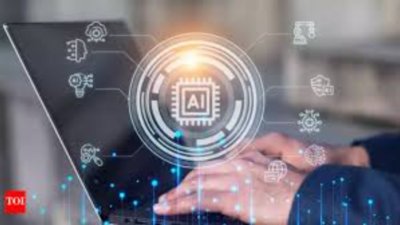Americans split on AI’s future as leadership stalls and classrooms struggle

In a rare moment of political symmetry, Americans across all ideologies have found common ground, not in unity of belief, but in collective uncertainty. Artificial Intelligence, once the darling of Silicon Valley hype and academic theory, now stands at the centre of a divided American consciousness. According to the NBC News Decision Desk Poll powered by SurveyMonkey, opinions on AI are fractured and unresolved, with no clear party, age group, or ideological bloc leading the charge. The future, it seems, is no longer left or right; it’s undecided.This ambivalence plays out in stark numbers. Just 7% of Americans believe AI will make their lives “much better,” while 16% believe it will make things “much worse.” The bulk of the nation hovers in the gray middle, unsure, anxious, and watching.
Policy paralysis in Washington
Despite AI’s growing ubiquity, from customer service to content creation, Washington remains stubbornly inert. The few regulatory frameworks introduced under President Joe Biden have largely been dismantled by the Trump administration. President Donald Trump’s rollback of AI oversight has since become part of a broader Republican embrace of tech deregulation, allowing powerful AI corporations to operate in an ethical vacuum.Yet, this isn’t a battle of partisan lines. The poll reveals that Democrats, Republicans, and independents use AI tools like ChatGPT, Microsoft Copilot, and Google Gemini at nearly identical rates. This technological neutrality, though rare in a polarized nation, has resulted not in consensus but in chaos.
Schools on the frontline
If AI is the future, then America’s classrooms are its proving grounds. But here, too, the nation is torn. A narrow majority, 53%, believes integrating AI into education better prepares students for the future. The remaining 47% argue the opposite, fearing dependency, diminished learning, and ethical blind spots.Educators are divided, not by doctrine but by desperation. Some are reverting to old-school tactics, handwritten essays, in-person exams, and AI detection software, while others are innovating with AI-integrated assignments.
No red, no blue—just gray
Surprisingly, the AI debate defies political stereotypes. Fifty-seven percent of Democrats support classroom AI use, compared to 50% of Republicans and 51% of independents. On the flip side, half of Republicans and nearly half of independents say banning AI better equips students, a view shared by 43% of Democrats.This strange ideological neutrality extends beyond education. When asked whether AI will improve their families’ futures, 50% of Republicans said yes, alongside 42% of Democrats and 41% of independents. Similarly, 39% of Republicans and 47% of Democrats believe AI will worsen lives. For once, the partisan compass is spinning without direction.
A nation holding its breath
Even age, often a key indicator in tech adoption, offers no clear fault lines. Younger adults, ages 18–29, are evenly split on whether schools should embrace or ban AI. Those aged 30–44 lean slightly more toward integration, but older generations remain similarly indecisive. The result: A technological revolution without a generational leader.Despite AI’s explosive potential, the national mood is less one of enthusiasm and more of caution, an eerie calm before an uncharted storm.
Waiting for a tipping point
In the absence of decisive legislation, AI’s integration into American life is being dictated not by lawmakers but by market forces, educators, and individual choices. Companies continue to roll out AI education tools, OpenAI’s ChatGPT Edu, Google’s Gemini for education, and Microsoft Copilot, while platforms like Khan Academy experiment with AI-powered tutors. Yet without a guiding national vision, these tools risk deepening inequality and confusion.The NBC poll doesn’t merely capture public opinion; it reveals a country stuck in philosophical limbo. The question is no longer whether AI will shape the future; it already is. The question now is: whose future will it serve, and at what cost?Until America decides, AI remains a mirror, not of what we believe, but of what we fear to answer.





